‘Catastrophe’: UN warning as Hezbollah rains rockets on Israel
Hundreds of thousands of people sought shelter from Hezbollah rockets fired from Lebanon into northern Israel as the UN issued a warning about the worsening violence. Follow for updates.
World
Don't miss out on the headlines from World. Followed categories will be added to My News.
Hundreds of thousands of people sought shelter from Hezbollah rockets fired from Lebanon into northern Israel on Sunday, the military said, as a UN official warned of imminent regional “catastrophe” from the worsening violence.
Israel has signalled its intention to turn its focus to Iran-backed Hezbollah after nearly a year of cross-border fire that began with the outbreak of the war between Israel and Palestinian Hamas militants in the Gaza Strip.
Further exchanges of fire came after military spokesman Rear Admiral Daniel Hagari late Saturday said dozens of Israeli warplanes were “widely” striking Hezbollah targets in southern Lebanon.
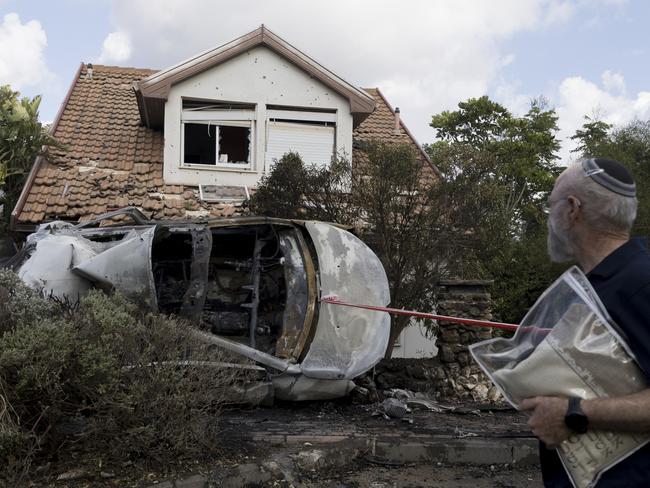
Analysts say Hezbollah – which says it is acting in support of ally Hamas – has been dealt a serious blow this week. Deadly attacks targeted its communications and decimated the leadership of its elite unit, although its ability to fight has not been crushed, the analysts said.
An Israeli air strike on Friday killed the head of Hezbollah’s elite unit Ibrahim Aqil.
“With the region on the brink of an imminent catastrophe, it cannot be overstated enough: there is NO military solution that will make either side safer,” United Nations special co-ordinator for Lebanon Jeanine Hennis-Plasschaert said on social media platform X.
The death toll from Friday’s attack on a densely-populated Hezbollah stronghold in south Beirut has risen to 45, the health ministry said.
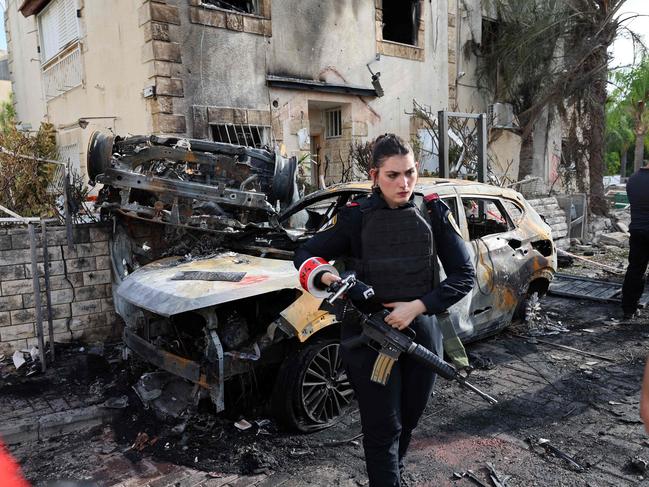
The Israeli army said more than 100 projectiles had been fired from Lebanon early on Sunday.
“Hundreds of thousands of people had to take refuge in bomb shelters” across northern Israel, said military spokesman Lieutenant Colonel Nadav Shoshani.
The military said it launched strikes on Hezbollah targets in southern Lebanon in response to the rocket fire and, Shoshani said, “to prevent a larger-scale attack”.
Israel’s rescue service said at least four people suffered “shrapnel injuries”, three near the city of Haifa.
Israel’s civil defence agency ordered all schools in the country’s north closed following the rocket fire.
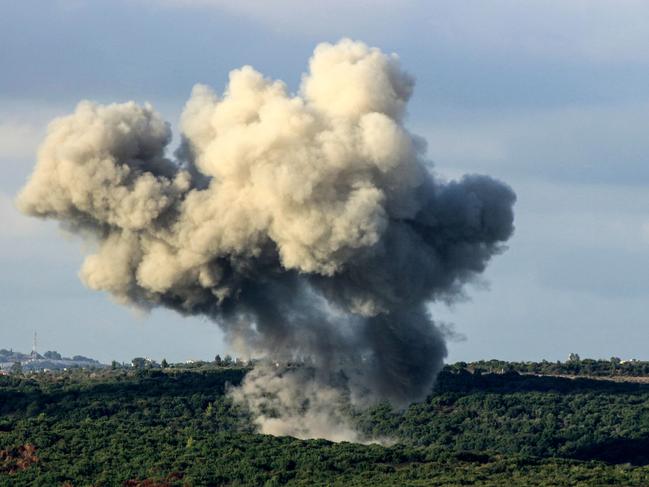
Hezbollah said it had targeted Israeli military production facilities and an air base in the Haifa area in response to the communication device blasts on Tuesday and Wednesday that killed 39 and wounded almost 3,000.
“In an initial response” to the explosions of the pagers and two-way radios, which it blamed on Israel, Hezbollah “bombed the Rafael military industry complexes” in northern Israel with “dozens” of rockets, the group said.
FOLLOW BELOW FOR UPDATES:
ISRAEL SHUTS DOWN AL JAZEERA NEWS BUREAU
Heavily armed and masked Israeli forces raided and shuttered the Ramallah office of Qatari broadcaster Al Jazeera on Sunday.
“There is a court ruling for closing down Al Jazeera for 45 days,” an Israeli soldier told Al Jazeera’s West Bank bureau chief Walid al-Omari, the network reported.
“I ask you to take all the cameras and leave the office at this moment,” the soldier said.
Footage showed heavily armed and masked troops entering the office. Al Jazeera said the soldiers did not provide a reason for the closure order, however it was not the first Israeli action against the news service.
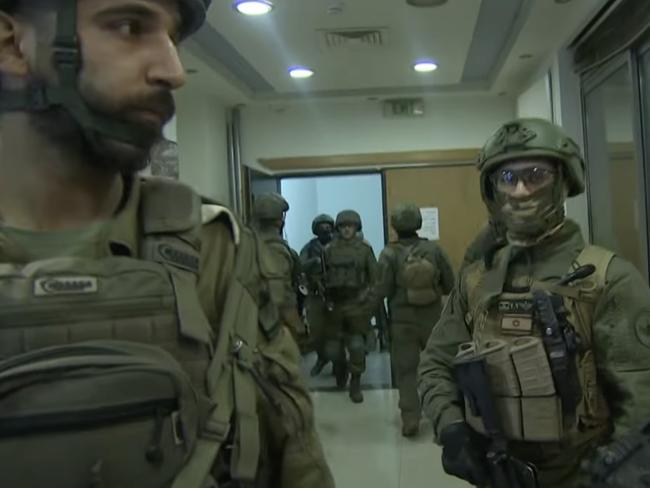
Al Jazeera’s Nida Ibrahim said the West Bank raid and closure order “comes as no surprise” after the earlier ban on reporting from inside Israel.
“We’ve heard Israeli officials threatening to close down the bureau. We’ve heard the government discussing this, asking the military ruler in the occupied West Bank to close down and shut down the channel. But we [had] not been expecting it to happen today,” Ibrahim said.
Last week Israel’s government announced it was revoking the press credentials of Al Jazeera journalists in the country, four months after banning the channel from operating inside Israel.
The shutdown had not affected broadcasts from the West Bank or the Gaza Strip, from which Al Jazeera still covers Israel’s war with Palestinian militants.
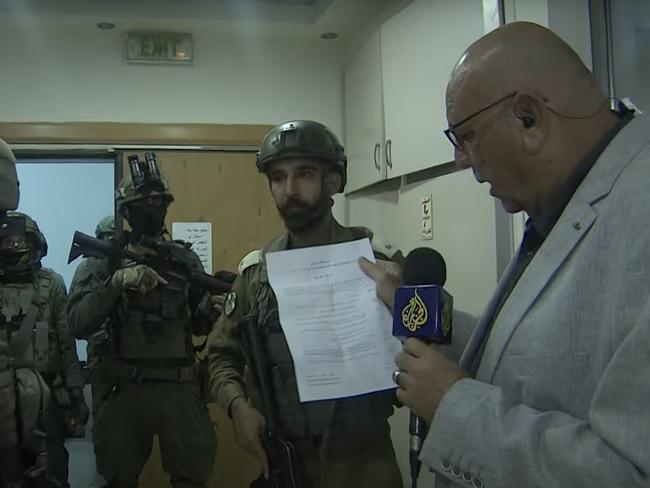
The Israeli military has repeatedly accused journalists from the Qatari network of being “terrorist agents” in Gaza affiliated with Hamas or its ally, Islamic Jihad.
Al Jazeera has denied the accusations and claimed that Israel systematically targeted its employees in the Gaza Strip.
Al-Omari raised concerns about what Israeli soldiers may do to the office.
“Targeting journalists this way always aims to erase the truth and prevent people from hearing the truth,” he told the broadcaster.
Meanwhile, the Government Media Office in Gaza called the Israeli move a “deafening scandal”.
“We call on all media organisations and groups that deal with human rights in the world to condemn this heinous crime … that is a blatant violation of press and media freedom,” it said.
HEZBOLLAH LAUNCHES MORE THAN 100 ‘PROJECTILES’ AT ISRAEL
More than 100 projectiles were fired from Lebanon early Sunday morning, sending fire services scrambling to put out blazes sparked by falling munitions.
The Israeli army said “approximately 85 projectiles were identified crossing from Lebanon into Israeli territory” starting shortly after 6am local time, while in a previous barrage starting shortly before 5am, “approximately 20 projectiles were identified crossing from Lebanon”.
Lebanon’s Hezbollah said it targeted Israeli military production facilities in response to blasts this week targeting the group’s communications devices that killed dozens and wounded almost 3000.
“In an initial response” to the explosions of the pagers and two-way radios blamed on Israel, Hezbollah “bombed the Rafael military industry complexes” in northern Israel with “dozens” of rockets, the Iran-backed group said in a statement.
The attack is Hezbollah’s deepest rocket fire into Israel since October.
Hezbollah claimed responsibility for the rocket fire on the Jezreel Valley that was targeting the Israeli Air Force’s Ramat David Airbase, about 50km from the Lebanon border.
The Israeli military said dozens of warplanes were striking Hezbollah targets in southern Lebanon late Saturday, as cross-border exchanges intensify amid growing fears of all-out war.
Israel also announced additional security measures for the country’s north.
“In the last hour we are attacking widely in southern Lebanon following the identification of Hezbollah’s preparations to fire into Israeli territory,” military spokesman Rear Admiral Daniel Hagari said in a televised statement.
“Dozens of air force aircraft are currently attacking terror targets and launchers to eliminate threats against the citizens of Israel.”
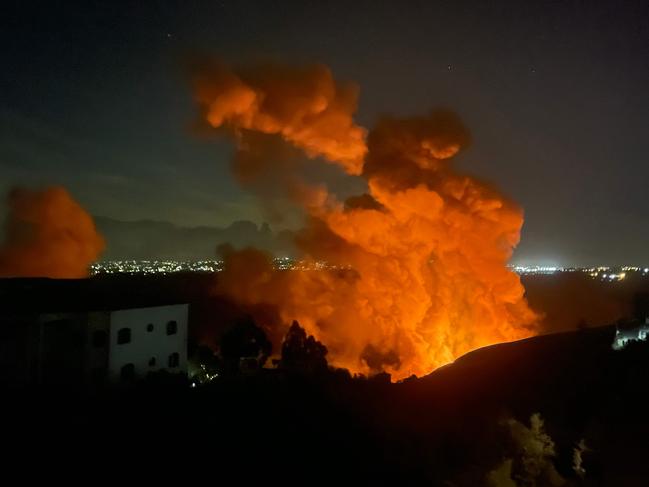
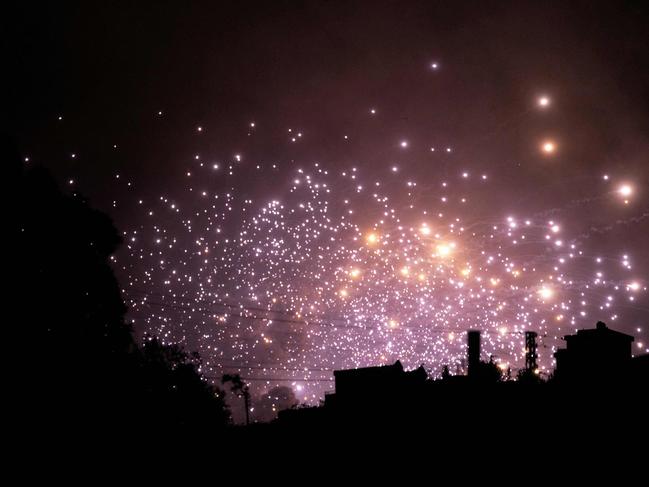
Earlier in the day the military said it had hit thousands of rocket launcher barrels and other targets belonging to Hezbollah.
The military said the launches posed an “immediate” threat, as fears grew of all-out war with Hezbollah.
Israeli aircraft “struck thousands of launcher barrels that were ready for immediate use to fire toward Israeli territory” as well as “approximately 180” other, unspecified targets, a military statement said.
The barrages came one day after an Israeli strike on Beirut killed 37 people, according to Lebanese officials, including senior commanders of Iran-backed Hezbollah.
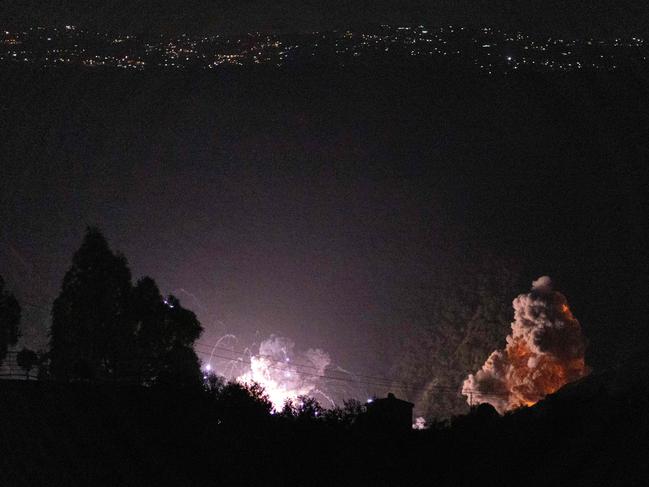
Last Friday’s strike followed sabotage attacks on pagers and two-way radios used by Hezbollah on Tuesday and Wednesday, which killed 39 people. Hezbollah blamed Israel, which has not commented.
Hezbollah began cross-border attacks on Israel after Hamas’s unprecedented October 7 attack on southern Israel triggered the ongoing war in Gaza.
Tens of thousands of people have been displaced from both sides of the Israel-Lebanon border.
On Tuesday Israeli Prime Minister Benjamin Netanyahu announced an expansion of the country’s war goals to include the return of northern Israeli residents.
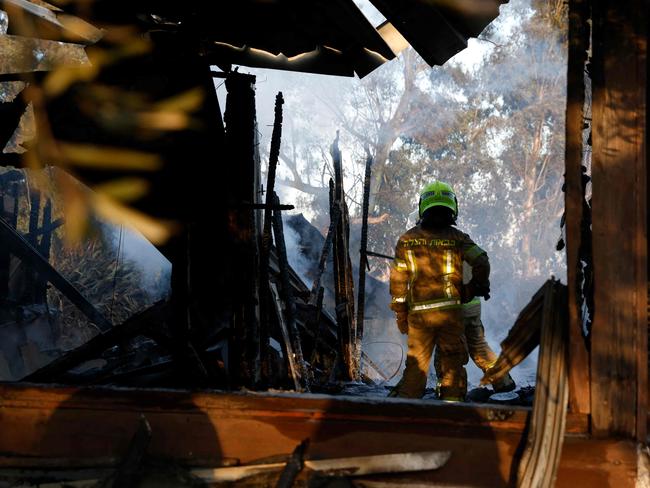
“It is possible that rockets and additional threats will be launched towards the country in the near future,” Rear Admiral Hagari said in his televised statement.
In a separate statement late Saturday, the military said it was tightening restrictions on public gatherings in northern Israel.
“Gatherings will be limited to 30 participants in an open area, to 300 participants in a closed space,” the statement said.
“Arrival to work is permitted as long as there is a protected space available, and educational activities can continue as long as there are protected spaces available,” the statement added, referring to shelters.
US CITIZENS URGED TO LEAVE LEBANON
US citizens in Lebanon have been urged to leave while commercial options are still available as the conflict between Israel and Hezbollah flares.
The US State Department updated its advisory late on Saturday (Sunday AEST).
“Due to the unpredictable nature of ongoing conflict between Hezbollah and Israel and recent explosions throughout Lebanon, including Beirut, the US Embassy urges US citizens to depart Lebanon while commercial options still remain available,” the State Department said.
“At this time, commercial flights are available, but at reduced capacity. If the security situation worsens, commercial options to depart may become unavailable,” it added.
In late July, the United States raised its travel advisory for Lebanon to its highest “do not travel” classification, after a strike on southern Beirut killed a top Hezbollah commander.
HEZBOLLAH CHIEF DEAD
It comes as Hezbollah announced that another one of its top commanders was killed in the targeted Israeli air strike on the country’s capital of Beirut.
Ahmed Wahbi, who oversaw the military operations of Hezbollah’s Radwan special forces unit until early 2024, is among the 16 members of the group who were killed in the strike, Reuters cited Hezbollah as saying.
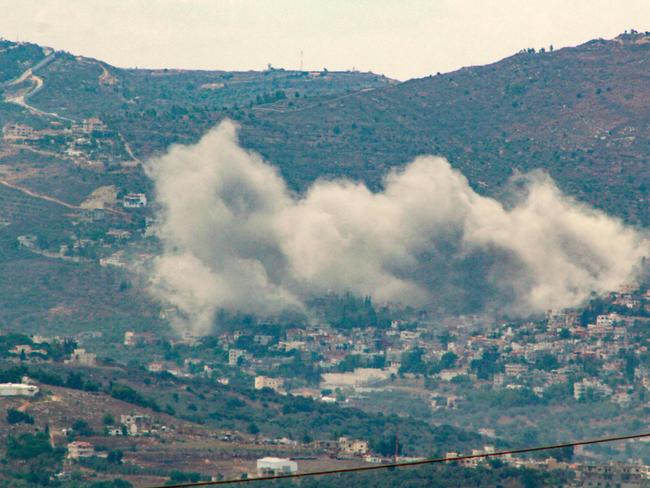
The announcement comes as the Israel Defence Forces said it was carrying out more air strikes targeting Hezbollah in Lebanon over the weekend.
Last Friday’s strike also killed Ibrahim Aqil, another commander of the Radwan special forces who served on Hezbollah’s highest military body, the Jihad Council, according to the USState Department.
“During the 1980s, Aqil was a principal member of Hezbollah’s terrorist cell the Islamic Jihad Organisation, which claimed responsibility for the bombings of the US Embassy in Beirut in April 1983, which killed 63 people, and the US Marine Corps barracks in October 1983, which killed 241 US personnel,” the State Department said.
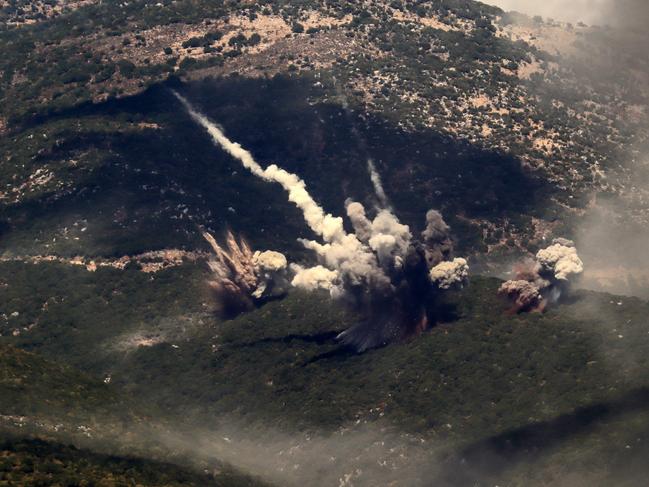
Hezbollah released a statement describing Aqil as “one of its top leaders” who was killed in a “treacherous Israeli assassination,” Reuters reported.
Israel said following the air strike in southern Beirut that “we can now confirm that Ibrahim Aqil was eliminated together with other senior terrorists in Hezbollah’s Radwan Forces”.
The overall death toll from the air strike is 31, including seven women and three children, Lebanon’s health minister said on Saturday local time.
The air strike reportedly knocked out an eight-story building that had 16 apartments and damaged another one adjacent to it. The missiles destroyed the first building and cut through the basement of the second where a meeting of Hezbollah officials was being held, according to media at the scene.
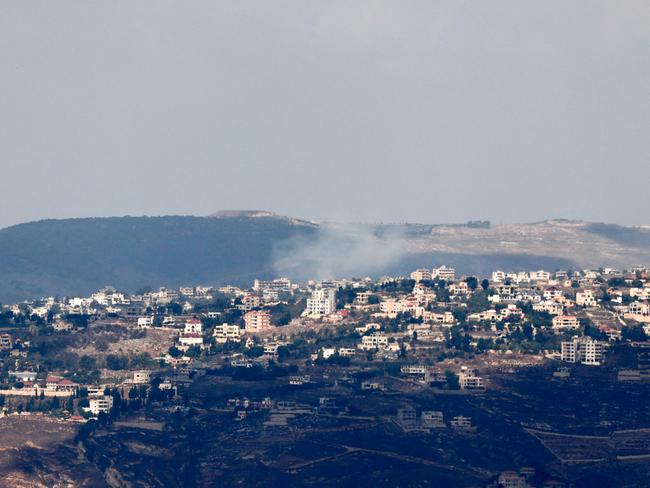
Health Minister Firass Abiad told reporters 68 people were also wounded of whom 15 remain in the hospital, adding that search and rescue operations were still ongoing, with the number of casualties likely to rise.
The Minister of Public Works and Transport Ali Hamie told reporters at the scene that 23 people are still missing.
ISRAEL STRIKES SCHOOL-TURNED-SHELTER
Gaza’s civil defence agency said an Israeli strike on a school-turned-shelter in the Palestinian territory’s largest city killed 21 people, while Israel’s army said it was targeting Hamas militants.
The dead included “13 children and six women”, one of whom was pregnant, said agency spokesman Mahmud Bassal.
There were “around 30 injured, including nine children (needing) limb amputations, as a result of an Israeli bombing on Al-Zaytoun School C” in Gaza City, he said.
Thousands of displaced people had sought shelter at the school, Bassal said.
Israel’s military said in a statement the air force had “conducted a precise strike on terrorists who were operating inside a Hamas command and control centre in Gaza City”.
It said the target was “embedded inside” the Al Falah School, which is adjacent to the Al-Zaytoun School buildings.
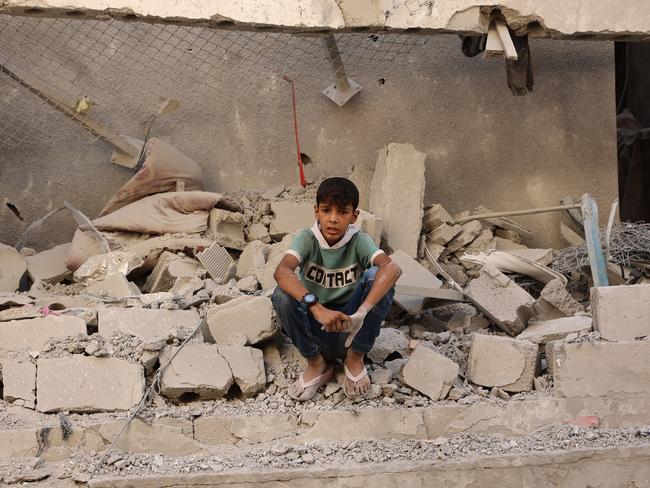
Witnesses said that before the strike, orphans had gathered there because they were due to receive sponsorship from a local NGO for humanitarian assistance.
Israel’s military did not provide a death toll but said “numerous steps were taken to mitigate the risk of harming civilians, including the use of precise munitions, aerial surveillance and additional intelligence”.
It was the latest in a series of Israeli strikes on school buildings housing displaced people in Gaza.
A strike on the United Nations-run Al-Jawni School in central Gaza on September 11 drew international outcry after the UN agency for Palestinian refugees said six of its staffers were among the 18 reported fatalities.
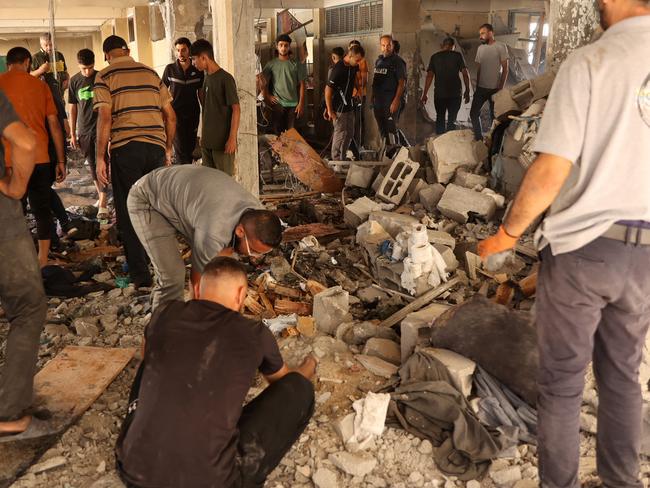
The Israeli military accuses Hamas of hiding in school buildings where many thousands of Gazans have sought shelter – a charge denied by the Palestinian militant group.
The vast majority of the Gaza Strip’s 2.4 million people have been displaced at least once by the ongoing war, which was triggered by Hamas’s October 7 attack on Israel.
That attack resulted in the deaths of 1,205 people on the Israeli side, most of them civilians, according to an AFP tally based on official Israeli figures, which includes hostages killed in captivity.
Out of 251 people taken hostage that day, 97 are still being held inside the Gaza Strip, including 33 who the Israeli military says are dead.
At least 41,391 Palestinians, a majority of them civilians, have been killed in Israel’s military campaign in Gaza since the war began, according to data provided by the health ministry in the Hamas-run territory.
The United Nations has acknowledged these figures as reliable.
‘LEAVE IMMEDIATELY’: AUSSIES TOLD TO GET OUT OF LEBANON
Australians in Lebanon have been told to “leave immediately while commercial flights remain available” as the latest Israeli attacks on Hezbollah fuel fears for all-out war.
The Australian Government’s updated its advice on the Smart Traveller site for Lebanon on Saturday local time.
“Australians in Lebanon should leave immediately while commercial flights remain available. Some airlines have postponed or cancelled some flights,” the updated advice stated.
“Further flight cancellations and disruptions could occur with little or no notice. You should take the first available flight and not wait for a preferred route.
“Beirut airport could close, and you may be unable to leave for an extended period. Airlines may cancel more flights or set high ticket prices for any remaining flights. There may also be other travel disruptions.
“The Australian Government may not be able to assist you to leave in such circumstances.”
While the government had been advising against travel to Lebanon since October 2023 due to the volatile security situation, it highlighted the risk of the security situation deteriorating further.
“The security situation could continue to deteriorate rapidly throughout Lebanon,” it said. “Air strikes have occurred, including in Beirut, and these may continue. Several thousand electronic devices exploded in Lebanon on 17 and 18 September. This resulted in deaths and serious injuries. Hospitals are treating high numbers of casualties, and some may be overwhelmed.”
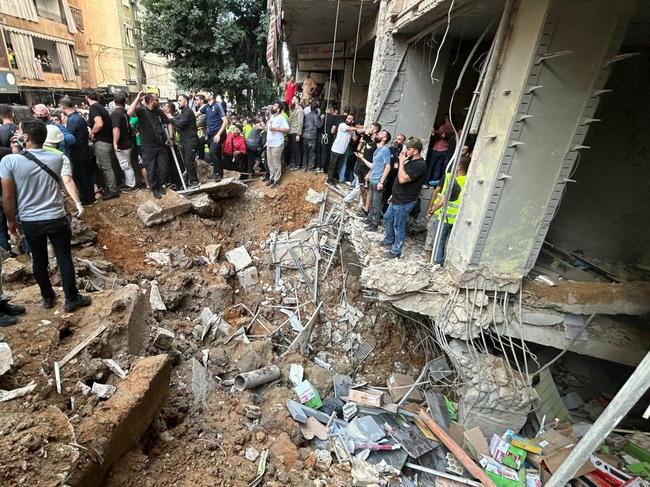
Australian Prime Minister Anthony Albanese also appealed to Australians to leave Lebanon when he spoke to media after a meeting with US President Joe Biden on Saturday. Mr Albanese warned the situation in Lebanon could become “more difficult”.
“We have been saying this for many months now. People should take the opportunity to get on a commercial plane and come back to Australia,” he said on Saturday.
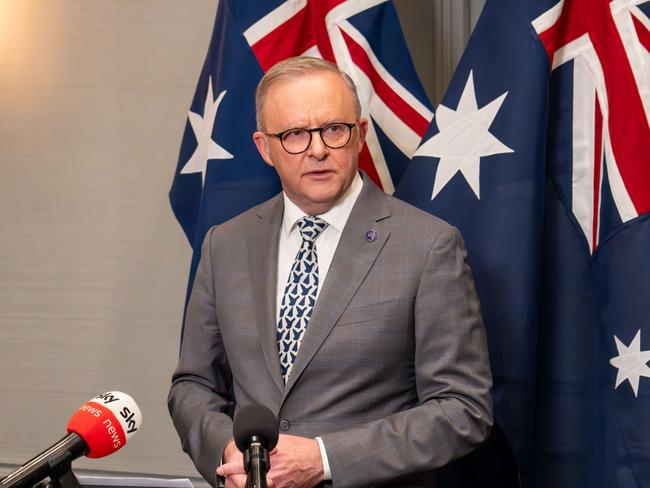
The Smart Traveller advice urged those Australians who chose not to leave while commercial flights were operating, to be prepared to shelter in place for an extended period.
“Make sure you have enough supplies including food, water, medicine, radio, torches and batteries. Know where your identity documents are, including your passport,” it said.
“Terrorist attacks could occur anytime and anywhere, including in Beirut.”
It also urged Australians to register with the Department of Foreign Affairs and Trade’s crisis registration portal, and to keep registration details up to date.
‘CROSSED THE RED LINE’: IRAN CONDEMNS LEBANON ATTACK
Iran’s ambassador to the United Nations has warned Israel “crossed the red line” after its recent attacks in Lebanon and said Tehran is exercising “maximum restraint”.
Israeli fighter jets unleashed a furious and targeted attack on Beirut on Friday, killing a top Hezbollah leader and 10 operatives just days after a series booby-trapped pagers and walkie-talkies were detonated, killing more than 30 and injuring almost 3000 on September 17.
Iran’s ambassador to Lebanon, Mojtaba Amani, was among those wounded.
Mr Iravani told the UN his country would “punish” the perpetrators.
Hezbollah has confirmed one of its top commanders, Ibrahim Aqil, was killed in Beirut on Friday, during Israel’s third attack on the Lebanese capital in recent months.
The Lebanese health ministry said a further 66 were injured during the strike.
Israeli Defence Force Chief of Staff Lieutenant General Herzi Halevi said in a statement to media that the strike was carried out on a known Hezbollah stronghold due to intelligence which showed the commanders were planning a terrorist attack.
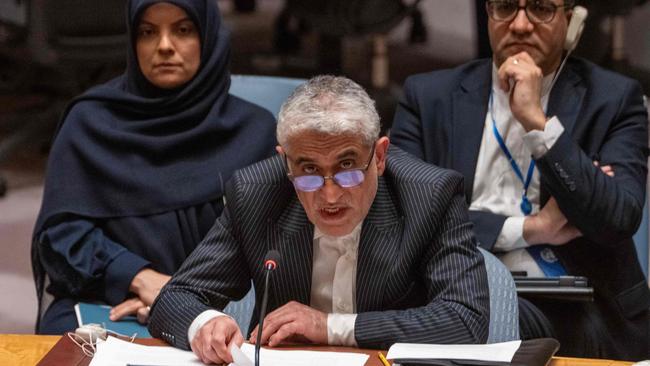
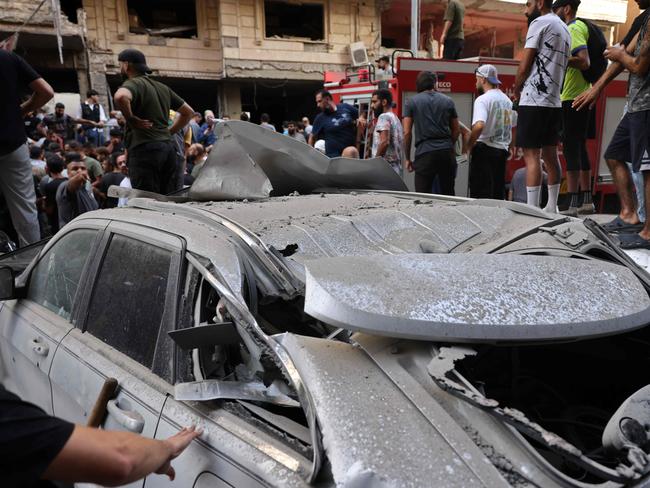
“The Hezbollah commanders we eliminated today had been planning an ‘October 7’ on the northern border for years. We reached them and we will reach anyone who threatens the security of the citizens of the State of Israel,” Lt Gen Halevi said.
Hamas condemned the strike labelling it “brutal and terrorist aggression launched by the Zionist enemy’s army aircraft on the southern suburb of Beirut.”
The United Nations said Friday it was “very concerned” after Israeli strikes hit the Lebanese capital Beirut, and urged all parties to exercise “maximum restraint.”
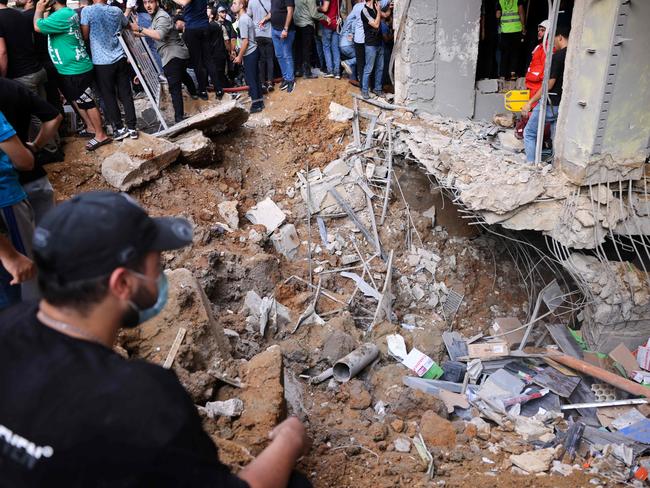
“We are, of course, very concerned about the heightened escalation … including the deadly strikes we saw in Beirut today. We urge all parties to de-escalate immediately. All must exercise maximum restraint,” said Stephane Dujarric, spokesman for UN Secretary-General Antonio Guterres.
HEZBOLLAH POUNDS ISRAEL WITH 150 ROCKETS
It is only the third time the IDF has targeted Beirut since the beginning of the war and comes after Hezbollah pounded northern Israel with 150 rockets.
The incoming fire came after the Israeli military said it struck dozens of rocket launchers overnight that were ready for use against Israel.
Hezbollah said it fired barrages of rockets at Israeli military bases in retaliation following Israel’s deadly blasts on pagers and walkie-talkies across Lebanon, which killed 37 people and wounded nearly 3,000 across two days.
Hezbollah leader Hassan Nasrallah vowed Israel would face “tough retribution” for the deadly device blasts that killed terrorists.
The group said it launched “salvos of Katyusha rockets” against at least six Israeli “army headquarters” and bases, including a “main air defence base”.
This is northern Israel right now following intensive Hezbollah rocket fire from Lebanon towards Israel.
— Israel Foreign Ministry (@IsraelMFA) September 20, 2024
Make no mistake: those who harm the people of Israel will pay the price. pic.twitter.com/dtXqXlL4Ub
Israel’s foreign ministry shared footage of “northern Israel right now following intensive Hezbollah rocket fire from Lebanon towards Israel.”
“Make no mistake: those who harm the people of Israel will pay the price,” it tweeted.
SICKENING VIDEO EMERGES OF ISRAELI SOLDIERS
Israel’s military is investigating after disturbing footage emerged of an Israeli raid in the occupied West Bank showing a soldier pushing an apparently dead man off a rooftop.
AFPTV footage of the operation in the town of Qabatiyah, near Jenin, on Thursday showed an Israeli soldier using his foot to roll the body towards the edge of the roof and then pushing him over, while at least two other soldiers looked on.
A soldier then picks up the hands of a second body while another soldier picks up the feet. They swing the body back and forth, then toss it over the side.
Finally, a soldier uses his feet to kick a third body over the side of the building.
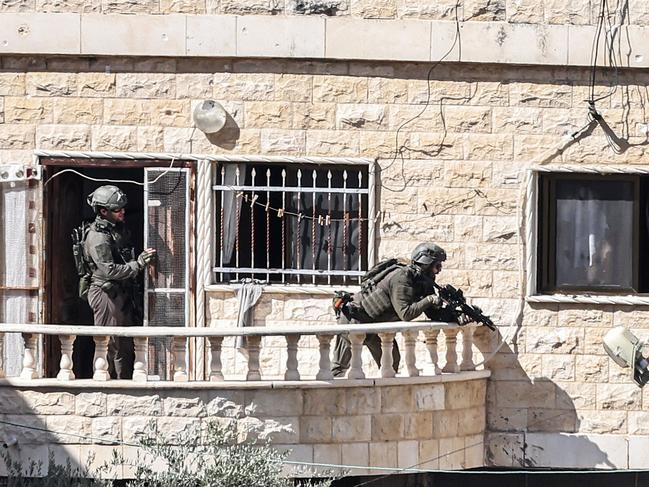
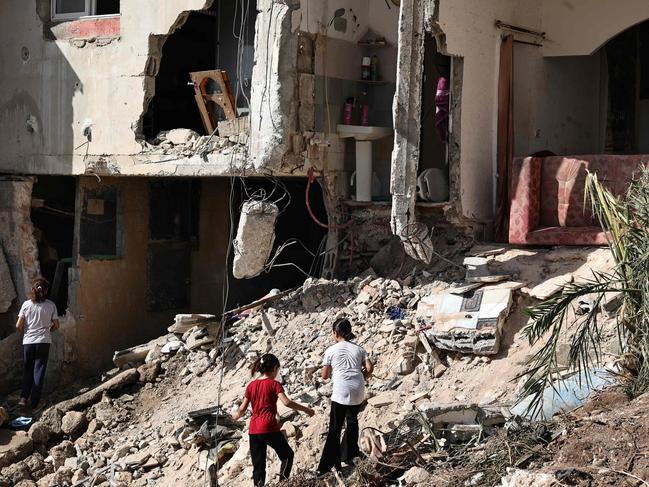
Qabatiyah is located in the northern West Bank, where the military has been carrying out large-scale raids since late August, which the Palestinian health ministry said has left dozens dead.
The military said in a statement on Friday that four militants were killed “in an exchange of fire” in Qabatiyah, while three were killed in an air strike on a vehicle.
Asked about the footage, the military said it would investigate.
“This is a serious incident that does not coincide with (Israel Defense Forces) values and the expectations from IDF soldiers. The incident is under review,” it said.
Under international law, armed forces are required to treat enemy bodies with respect, prevent them from mutilation and return them to their families.
‘THIS COULD BE WAR’ HEZBOLLAH’S THREAT AS ISRAEL STRIKES
Israeli warplanes carried out dozens of attacks across Lebanon’s southern border hours after Hezbollah leader Hassan Nasrallah vowed Israel would face “tough retribution” for the deadly device blasts that killed terrorists.
On Friday morning (AEST), the Israeli army said it struck “hundreds of rocket launcher barrels” ready to be fired toward Israel as well as “approximately 100 launchers and additional terrorist infrastructure sites”, the army said in a statement.
There were more than 52 strikes from Israel, according to news agency NNA, with Lebanon security sources describing the attack as the heaviest aerial strikes since October.
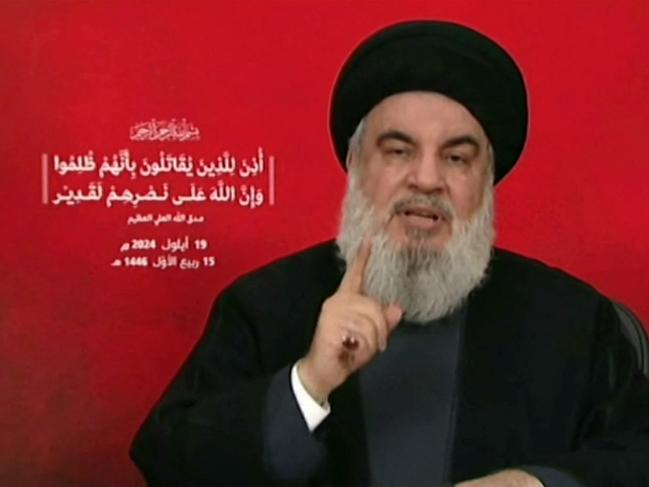
In Hassan Nasrallah’s first speech since the attacks, he said the group suffered an “unprecedented” blow when about thousands of operatives’ communication devices exploded across Lebanon, which killed 37 people and wounded nearly 3,000 across two days.
As he delivered his televised address, Israeli warplanes broke the sound barrier over Beirut.
Nasrallah described the attacks as a “massacre” and a possible “act of war”, and said Israel would face “tough retribution and just punishment, where it expects it and where it does not”.
About 25 Hezbollah terrorists were killed in the blasts, with a source close to the group saying at least 20 had died when their walkie-talkies blew up.
The preliminary findings of a Lebanese investigation found the pagers had been booby-trapped, a security official said.
The country’s mission to the United Nations concurred, saying in a letter that the probe showed “the targeted devices were professionally booby-trapped … before arriving in Lebanon, and were detonated by sending emails to the devices”.
Israel has not commented on the attacks in which 5000 Hezbollah communication devices – 4000 pagers and 1000 walkie-talkies – exploded in supermarkets, on streets and at funerals.
But Defence Minister Yoav Gallant said on Wednesday, in reference to Israel’s border with Lebanon: “The centre of gravity is moving northward. We are at the start of a new phase in the war”.
More Coverage
Originally published as ‘Catastrophe’: UN warning as Hezbollah rains rockets on Israel


